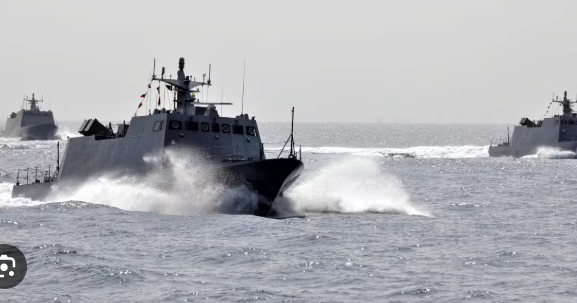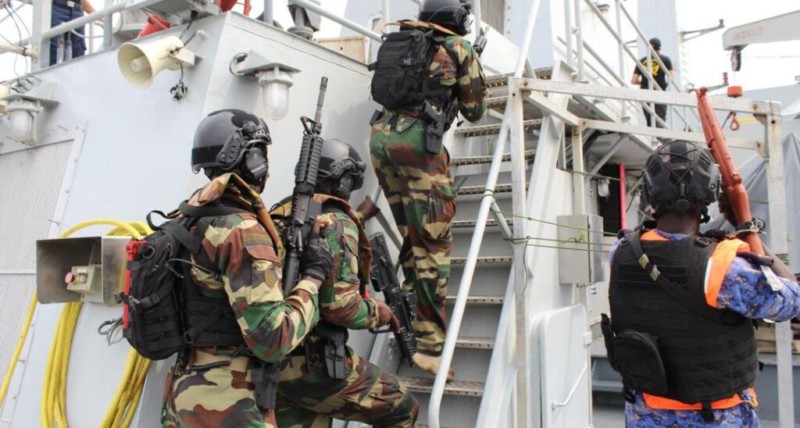
Significant events in 2024 remind us that the sea has become more than ever a major arena of global competition, analyzes Laurent Célérier, a defense expert and naval captain, in a column for Le Monde.
Four key figures from 2024 shed light on maritime dynamics that will shape geopolitics in 2025. Between underwater infrastructures disrupted by hybrid actions, illicit maritime trafficking aimed at bypassing sanctions, asymmetric attacks using drones, and the Chinese naval threat, the sea is asserting itself as a primary stage in global competition. In 2025, the winds from afar will shake the international scene.
In 2024, 15 new underwater telecommunications cables were added to the 559 already laid across the world. In November 2024, two incidents struck undersea cables in the Baltic Sea. Swedish authorities suspect a 225-meter Chinese bulk carrier, the Yi-Peng-3, of intentionally dragging its anchor. On December 24, the EstLink 2 power link between Finland and Estonia was cut, with the rupture this time attributed to the Russian tanker Eagle S. These incidents, for which responsibility is hard to assign, reflect an increase in hybrid tactics and clandestine operations aimed at exerting pressure without triggering direct confrontation.
In response to these threats, NATO plans to strengthen surveillance of critical zones and vessels in 2025. Meanwhile, the United Nations (UN) has created a panel of experts tasked with proposing protection strategies for these infrastructures. These cables support 95% of global communications and an increasing share of energy transfers. But they are inherently vulnerable.
Maritime Black Market
Another maritime issue: the suspected « ghost fleet » from Russia, which is believed to enable the bypassing of economic sanctions. Since the start of the Western embargo on Russian oil exports, Moscow has relied on a ghost fleet estimated at 600 aging vessels, owned by unscrupulous shipowners, operating under compliant flags, and evading inspections. It is estimated to transport around 1.7 million barrels of oil per day. While the sanctions aim to reduce the Kremlin’s financial capacities, they have also fueled a maritime black market at the expense of crews and the environment, as well as eroding safety standards. For instance, between May and August 2024, 283 tankers from this fleet crossed the Baltic Sea from Russia.
The resolution of the Ukraine war in 2025 and the potential lifting of sanctions would partially address the problems posed by this ghost fleet. However, the fight against a parallel maritime economy remains a long-term challenge that requires a more innovative and coordinated response from the UN. The ecological, economic, financial, insurance, and geopolitical risks are too great.
High-Intensity Warfare in the Heart of Global Trade
In the southern Red Sea, a high-intensity war is unfolding. Triggered by attacks on October 7, 2023, 86 strikes carried out by Houthi rebels near the Bab Al-Mandab Strait in 2024 have had massive repercussions. Traffic through the Suez Canal halved, maritime transport became more expensive due to extended routes and higher insurance premiums. Despite Western naval operations, including Aspides by the European Union and Prosperity Guardian by the United States, major shipping companies prefer routes bypassing the Cape of Good Hope. These attacks highlight the rise of asymmetric tactics combining drones and missiles.
According to the US Navy’s chief of staff, the US Navy has not faced such a level of confrontation since World War II. This situation has exposed the vulnerability of global maritime routes to unconstrained non-state actors. It has also highlighted the limited availability of European navies to respond to « high-spectrum » attacks, such as terrorism or hostage-taking. In 2025, a de-escalation in Gaza could lead to a return to the pre-war situation where the threat posed by the Houthis was latent but insufficient to disrupt civil traffic in the Red Sea. However, recent direct strikes between Israel and Houthi rebels suggest that instability in Bab Al-Mandab could persist. In the long run, only a political resolution to the Yemeni conflict could restore long-term confidence among shipowners.
Exacerbation of Tensions
Geopolitical tensions are also escalating in the Pacific region. Once considered a regional navy until the early 2000s, the Chinese navy has shifted to a strategy of « operations in distant seas » coupled with securing the « new Silk Roads. » In September 2024, China simultaneously deployed three aircraft carriers, including the still-under-construction CNS Fujian, marking a significant advance in its naval capabilities and defensive operations.
Source: acrobat



